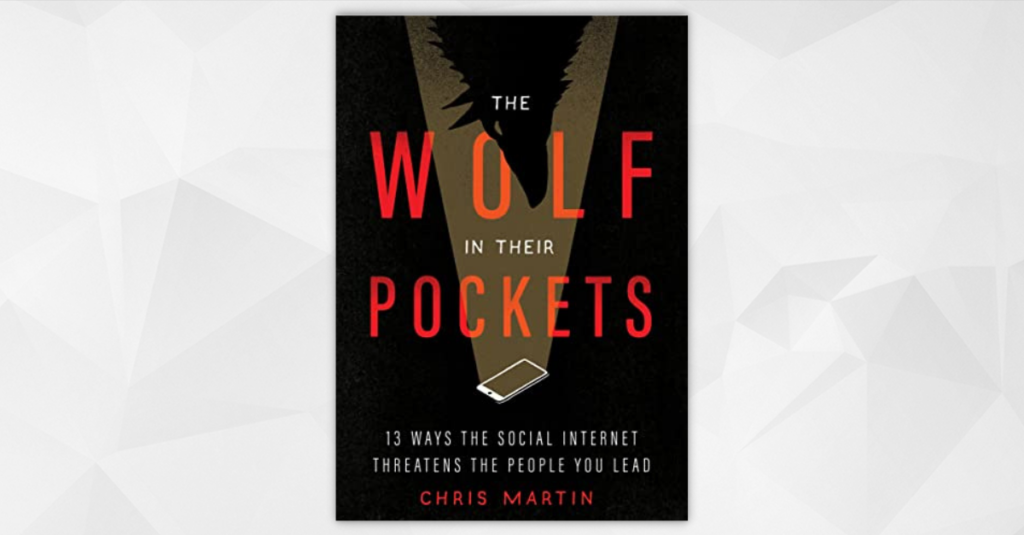Books Review: The Wolf in Their Pockets, by Chris Martin
July 27, 2023

July 27, 2023
Chris Martin, The Wolf in Their Pockets: 13 Ways the Social Internet Threatens the People You Lead. Moody Publishers, 2023. 224.
In the last few years, a considerable shift has occurred in how we think about the role of social media in our lives.
We were once deluded by promises of rich online connections and access to more information than ever before, but most have realized that technology is not a neutral tool that will usher in a more utopian society. In truth, social media has always been a tool that shapes us in distinct ways, often toward self-promotion, tribalism, anxiety, and even our own versions of the truth.
Chris Martin’s The Wolf in Their Pockets joins the chorus exposing the false promises of social media, but does so with an eye toward equipping church leaders to wisely combat its corrosive effects in our churches, businesses, and families. As Martin rightly points out, “Social media likely shapes the people you love and disciple more than you do” (11). The question church leaders must ask today is not if our social media and technology habits are shaping our view of God, ourselves, and the world around us, but how they’re doing so and what to do about it.
The Wolf in Their Pockets is not intended to be a robust, academic account of the role social media plays in our lives but a crucial on-ramp to an intentional conversation that must take place among the people we lead today (12).
The book is organized around thirteen ways Martin sees the social internet threatening the people you lead, running the gamut of issues ranging from our purpose in life, the nature of friendships, cultivating humility and discernment, grappling with anxiety, the nature of sex, and recovering truth in an age of conspiratorial thinking. Throughout the book, he uses the terminology of “social internet” rather than “social media” to speak about the broader tools and culture created by these technologies.
Martin argues the three “cornerstone” values of the social internet are entertainment, attention, and identity, which are deeply intertwined and drive much of our engagement with our phones and devices throughout the day (17). We all spend more time connected to these devices than we may be comfortable sharing with others. They never truly leave our side—beginning with the first thing many of us see in the morning and often the last thing we check before drifting off to sleep. Pastors will agree with much of Martin’s assessment of how social media alters the way our people think and what they believe.
Martin’s evaluation of technology’s formative power is exactly on target. At times, though, his argument is framed in an apocalyptic, fearful note, as seen in the wolf imagery used throughout the work, as well as his view that social media is an “unprecedented institution of socialization whose only comparable innovation in recorded history is the Tower of Babel” (14). He argues we need to cultivate wisdom to “push back the darkness of our modern Babel.”
It’s correct that these tools are changing us, often in negative ways. But this truth is cloaked in what seems to be an overly narrow view of the uniqueness of social media in human history and, at times, a pessimistic outlook on technology (22).
Allusion to the Tower of Babel-status of social media (which is not unique to Martin’s work) can be a strained analogy that overlooks how each generation feels an existential angst over technical innovations and how they deeply alter the fabric of society. The printing press, for example, revolutionized every aspect of society as it ushered in the modern world.
Martin’s overall point about the deeply formative effects of social media is well taken, though, and sorely needed to shake us from a mere tool-based approach to these technologies. Nothing is truly neutral, whether it’s the public square or your social media feed. Everyone and everything intentionally seeks to shape you and your behavior, from what you purchase, to what you believe, and even how you engage the most important social and ethical issues of our day.
Church leaders engaging this volume will appreciate his simple approach of describing a problem, applying biblical principles, and explaining how the social internet often exacerbates deep tensions and rifts of living in a self-centered world. He notes that “social media is the perfect tool to amplify the feeling that we are the main characters of our stories” (202).
Through all of the issues addressed, Martin pointedly and rightly reminds us that “our online lives are our real lives. Who we are online is who we really are” (44). The way we engage others on the most important issues of the day matters. The last thing that should be said of a Christian is “they are a lot kinder in person than online.” This truth is one of the most salient modeled throughout this volume, and the church today needs to embrace it desperately.
The Wolf in Their Pockets is full of wisdom for weary pastors who are wondering how to start these vital conversations in their communities about the role social media and technology play in the lives of their people. It will prepare readers to take crucial next steps into the theological and ethical contours of our digital age. As Martin notes, social media is not a fad; it’s deeply shaping your people, whether you courageously address it head on or not.